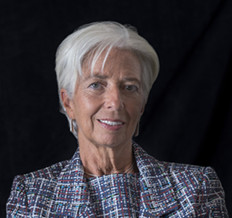Bitcoin: Financial Elites Are Getting Involved
At least two things; they hold important positions within the global financial system and they are positive about the potential of cryptocurrencies and/or Bitcoin (BITCOMP). These are landmark statements. So far most of the support for cryptocurrencies had to come from people with a good understanding of tech. Like Bill Gates or Peter Thiel. Now, within the timespan of a week, there are positive comments from three people with leadership positions in finance.

Source: IMF
Larry Fink on Bitcoin
Larry Fink, CEO of Blackrock (BLK) told Bloomberg TV he A) believes in blockchain and B) is a big believer in the potential of what a cryptocurrency can do.
He also added what we are seeing today is a lot of speculation and cryptocurrencies bring to light how much money laundering is being done in the world. How much people are moving currencies from one place to another. He also sees a potential for cryptocurrencies to solve that problem:
“If we create a true global digitized currency then you would not have money laundering anymore,” he said. In that case, there are concerns about protecting the system from cyber problems, he said.
Finally, he said they are not hearing about any demand from clients. Except for venture capital type investments. Well, since Blackrock owns iShares, I’ll say I believe there is a lot of demand for an iShares Bitcoin product. If they could roll it out as a first to market ETF it would be a runaway success.
Lloyd Blankfein on Bitcoin
Goldman Sachs CEO Lloyd Blankfein was the most measured of the bunch and simply tweeted.

It doesn’t read all that positive but because of the comparison to paper money (which has been quite a big success) and the reporting by the WSJ Goldman is working on a Bitcoin project with both the currency-trading division and the bank’s strategic investment group I think it can be interpreted as quite positive. A stark contrast to JPMorgan’s Jamie Dimon who called it a fraud not long ago.
Christine Lagarde on Bitcoin
The most positive, and best informed, opinion was expressed by the IMF’s Christine Lagarde. She gave a speech, invited by the Bank of England, and chose virtual currencies as one of three important subjects in Fintech. The entire speech can be read on the website of the IMF but I’ll highlight some of the gems for you:
IMF experience shows that there is a tipping point beyond which coordination around a new currency is exponential. In the Seychelles, for example, dollarization jumped from 20 percent in 2006 to 60 percent in 2008.
and
And yet, why might citizens hold virtual currencies rather than physical dollars, euros, or sterling? Because it may one day be easier and safer than obtaining paper bills, especially in remote regions. And because virtual currencies could actually become more stable.
Conclusion
Two out of three leaders see great potential for a cryptocurrency. The other one is preparing to get his hands dirty and start trading. Although these comments made headlines I believe the significance has been underplayed somewhat. These are some of the most important people in global finance and they aren’t calling Bitcoin a fraud but interested in its potential and will perhaps soon start engaging with it. This is a very different message from that expressed by Jamie Dimon. And it is a big deal with the mainstream but also high placed politicians who may take ill-advised measures because of their lack of understanding. Finally, IMF research on a tipping point for coordination around a currency is really interesting. This is a very underappreciated positive for Bitcoin. It argues betting on the leaders, those with the highest market caps, among the cryptocurrencies is best.



